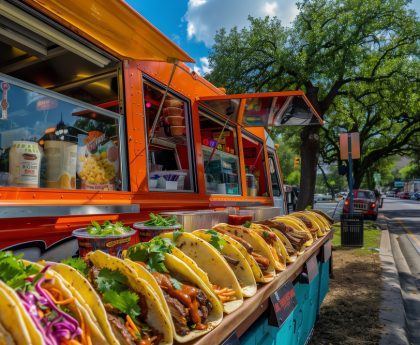Running a food truck is a thrilling adventure filled with unique challenges and rewards. One of the most significant challenges that food truck owners face is managing inventory and avoiding supply shortages, especially during peak hours. This blog post will delve into real stories of food truck supply shortages and provide tips on how to handle and prevent these stressful situations.
The Challenge of Food Truck Supply Shortages
Food truck supply shortages can occur for several reasons, including poor planning, unexpected demand, delivery issues, and ingredient spoilage. Running out of key ingredients during peak hours not only disrupts operations but can also lead to disappointed customers and lost revenue. Let’s explore some real-life scenarios and lessons learned from food truck owners who have faced these challenges head-on.
Real-Life Stories of Supply Shortages
Story 1: The Unexpected Rush
Sarah, the owner of a popular taco truck, experienced a massive supply shortage during a local music festival. “We were prepared for a busy day, but we didn’t anticipate the sheer volume of customers,” she recalls. By midday, they had run out of tortillas and several key toppings. “It was a nightmare. We had to close early and lost out on a lot of potential sales.”
Lesson Learned:
Sarah learned the importance of over-preparing for large events. Now, she always orders extra supplies and has backup ingredients on hand to avoid running into the same issue again.
Story 2: The Delivery Delay
Mike runs a gourmet burger truck and relies heavily on fresh, locally-sourced ingredients. One Friday evening, his meat delivery was delayed, leaving him without enough patties to meet the demand. “I had a line of customers and nothing to serve them,” he says. “I had to quickly improvise and turn my burgers into sliders to stretch the supply.”
Lesson Learned:
Mike realized the importance of having a contingency plan. He now keeps a small stock of frozen patties as a backup and has established relationships with multiple suppliers to avoid future delivery delays.
Story 3: The Spoiled Ingredients
Lisa operates a vegan food truck and prides herself on using fresh produce. One hot summer day, her refrigerator malfunctioned, causing several ingredients to spoil. “I had to throw out half my inventory,” she laments. “I couldn’t serve most of my menu, and I had to turn away customers.”
Lesson Learned:
Lisa learned the hard way about the importance of equipment maintenance and backup plans. She now conducts regular checks on her refrigerator and keeps a small stock of non-perishable ingredients to use in emergencies.
Tips to Prevent Food Truck Supply Shortages
1. Accurate Inventory Management
Maintaining accurate inventory records is crucial for preventing food truck supply shortages. Use inventory management software to track stock levels, monitor usage patterns, and set reorder points. Regularly count your inventory to ensure the data is accurate and adjust your ordering based on trends and upcoming events.
2. Establish Strong Supplier Relationships
Building strong relationships with reliable suppliers can help you avoid supply shortages. Communicate your needs clearly and regularly with your suppliers and establish backup options in case your primary supplier is unable to deliver. Consider working with local suppliers who can provide fresh ingredients quickly and efficiently.
3. Plan for Peak Hours and Events
Anticipate busy periods and events that may increase demand for your food truck. Order extra supplies for weekends, holidays, and special events. Consider the location and size of the event to estimate the number of customers you might serve. It’s better to have a little extra inventory than to run out during peak hours.
4. Maintain Backup Supplies
Keep a small stock of non-perishable or frozen ingredients as a backup. These can be lifesavers in case of unexpected demand or delivery delays. Items like frozen patties, canned beans, and dry pasta can be stored easily and used when fresh ingredients run out.
5. Regular Equipment Maintenance
Ensure that all your equipment, especially refrigeration units, is in good working order. Regular maintenance checks can prevent equipment failures that lead to ingredient spoilage. Have a backup plan in place, such as a portable cooler, in case of equipment malfunctions.
6. Train Your Staff
Your staff should be trained to handle supply shortages efficiently. Teach them how to substitute ingredients, manage portions, and communicate with customers about menu changes. Empower your team to make quick decisions to keep the operation running smoothly.
7. Flexible Menu Planning
Design a menu that allows for flexibility. Include dishes that can be easily adapted based on available ingredients. This way, if you run out of a particular ingredient, you can still offer a modified version of the dish without disappointing customers.
Food truck supply shortages during peak hours can be a major headache, but with careful planning and preparation, you can minimize their impact on your business. By maintaining accurate inventory records, establishing strong supplier relationships, planning for busy periods, maintaining backup supplies, regularly checking equipment, training your staff, and having a flexible menu, you can navigate these challenges successfully.
The stories shared by Sarah, Mike, and Lisa highlight the importance of learning from past experiences and continuously improving your operations. Running out of ingredients doesn’t have to mean the end of your business day. With the right strategies in place, you can handle supply shortages with grace and keep your customers satisfied.
Remember, the key to food truck success lies in preparation and adaptability. By focusing on these aspects, you can ensure that your food truck remains a popular choice for customers, even during the busiest times. Implement these tips to prevent food truck supply shortages and keep your business thriving.
For more tips and resources on running a successful food truck, visit myfoodietruck.com.





